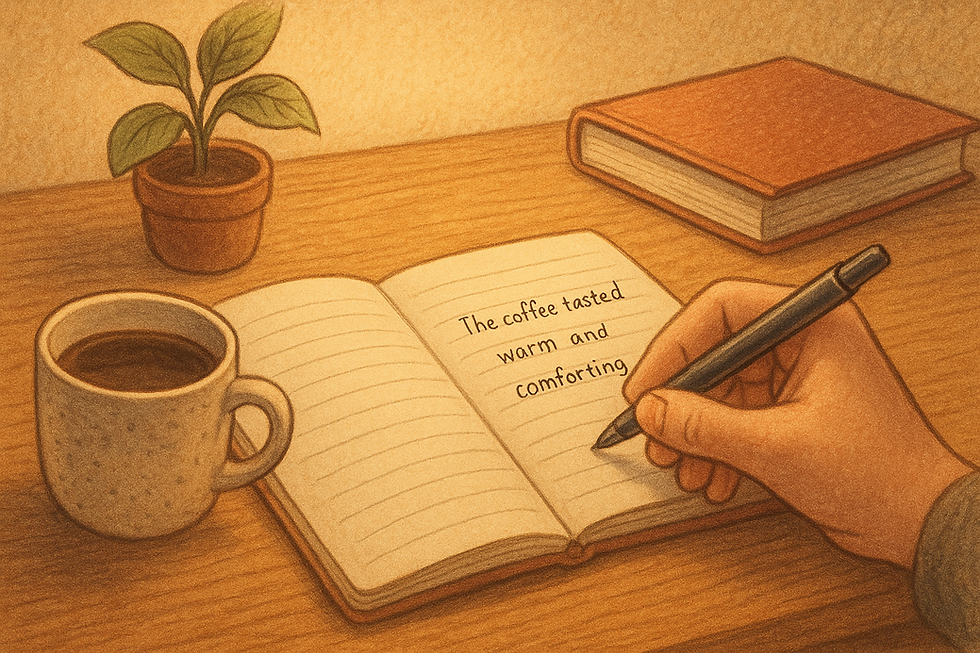Happiness Isn’t a Goal — It’s a Side Effect of These 3 Inner Superpowers
- ZillionPals

- Jun 21, 2025
- 3 min read
Updated: Jul 5, 2025

What I learned about creativity, intelligence, and self-confidence on a rainy afternoon changed the way I understand happiness forever.
It was a quiet Tuesday, the kind that feels like it’s holding its breath. I was alone in a café, sipping lukewarm coffee, doodling thoughts in a notebook I hadn’t opened in weeks. Then something shifted.
Ideas began to pour out. I wasn’t writing for work, or for validation — I was creating for the sake of creating. And for the first time in a long time, I felt genuinely happy.
That moment made me realize a truth I had been circling for years:I am happiest when I am creative, intelligent, and self-confident. And when I live from that space, happiness isn’t something I chase — it becomes something I embody.
🎨Creativity: The Daily Dose of Dopamine We Ignore
We often associate creativity with artists, musicians, or writers. But research shows that even casual creative activities — like cooking, journaling, or DIY projects — can boost mental well-being.
According to a 2016 study in The Journal of Positive Psychology, people who engaged in creative activities experienced more positive emotions the following day, along with a greater sense of purpose and meaning in life (Conner et al., 2016).
What most blogs miss? Creativity isn’t just a feel-good hobby — it literally rewires your brain. Engaging in creative thinking promotes neuroplasticity, making you more adaptable and emotionally resilient.
🧠 Intelligence: More Than IQ, It’s How You Learn and Adapt
Pop culture praises IQ, but real-life happiness comes from what researchers call adaptive intelligence — your ability to learn, reflect, and solve problems in ever-changing environments.
A 2020 study published in the Journal of Intelligence found a strong link between emotional intelligence (EQ) and overall well-being. People with high EQ reported fewer symptoms of depression and anxiety, and more life satisfaction (Sánchez-Álvarez et al., 2020).
This isn’t about being the smartest in the room. It’s about staying curious, asking questions, and embracing learning as a lifelong process. And the best part? Every time you learn something new, your brain gives you a hit of dopamine — just like it does with sugar or social media.
💪 Self-Confidence: The Inner Belief That Fuels It All
Self-confidence is rarely talked about in connection with happiness, but it’s a core emotional anchor. It’s not the loud, external bravado you see on social media — it’s the quiet belief that you can handle life.
Research from the University of Melbourne shows that people with higher self-confidence tend to earn more, enjoy healthier relationships, and are generally more satisfied with their lives. But here’s what sets this apart: self-confidence grows when you engage in creativity and learning.
In other words, confidence isn’t the starting point — it’s the outcome of expressing your creativity and intelligence regularly.
🔄 The Virtuous Cycle of Inner Joy
When you’re creative, you’re engaging your intelligence. When you apply your intelligence, you build self-confidence. And when you’re self-confident, you give yourself permission to create more freely. It’s a self-sustaining feedback loop — one that generates deep, lasting happiness.
And best of all? You don’t need permission, status, or perfection to start.
🧭 Final Thought
The biggest misconception about happiness is that it’s something to achieve. But the truth is, happiness is a byproduct.When you live from your inner superpowers — creativity, intelligence, and self-confidence — you don’t have to find happiness.
It finds you.
Credits: Deep Trivedi, ChatGPT & Gemini.



I really appreciate your wisdom and the way you’ve written and presented this article so beautifully.
Great insights on the link between creativity, intelligence, and self-confidence. Definitely a must-read!
Must-read article for lifelong happiness.